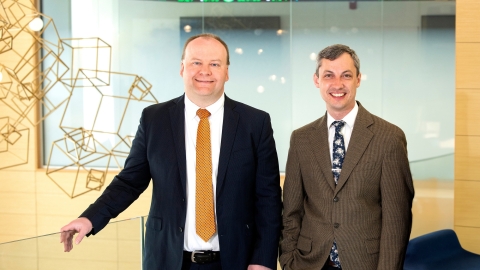
Professors Publish Tips for ChatGPT Use in Accounting
October 12, 2023
Professor of Practice Joe Wilck (left), analytics & operations management; and Professor Daniel Street (right), accounting, have been conducting ChatGPT research over the past year. Photo by Emily Paine, Communications
By now, most people who have tried ChatGPT have found at least one useful way to integrate it into their lives. Two Bucknell University Freeman College of Management professors now provide help to accountants on how to make the most of ChatGPT and other large language models (LLMs) in a new paper, published online by The CPA Journal.
Professor Daniel Street, accounting; Professor of Practice Joe Wilck, analytics & operations management; and Zach Chism, instructor of accounting, Culverhouse School of Accountancy, the University of Alabama, co-authored the paper, Six Principles for the Effective Use of ChatGPT and Other Large Language Models in Accounting.
"Applying these principles will enable CPAs to minimize the risk of this emerging technology while still reaping the available benefits of increased efficiency and effectiveness," Street says.
The authors recommend these principles to guide CPAs as they seek to leverage LLMs:
- Develop specific questions and avoid broad requests.
- Actively integrate yourself into the inquiry and interpretation process by breaking down complex tasks into verifiable subtasks.
- Understand LLMs’ contextual boundaries, and do not input private, sensitive or proprietary information.
- Carefully scrutinize and recalculate quantitative responses.
- Rely on other sources for factual information, especially for less prominent topics.
- Use LLMs to enhance — rather than replace — human expertise.
"We recommend that CPAs provide LLMs with prompts that are specific, provide the context for the question, explain or define ambiguous terms, and provide an example, if applicable," Wilck says.
Unless LLMs are implemented with reliable privacy safeguards — such as an "on-premise server" — the authors recommend that CPAs do not input private, sensitive or proprietary information into them.
They also wrote that it’s critical that CPAs exercise skepticism and utilize their expertise to ensure that proper concepts have been applied in the output of the LLM.
While the authors recommend that accountants use LLMs to enhance their work, they do not predict the "death of accounting" at the hands of LLMs anytime soon for these reasons:
- An LLM cannot be relied upon as a trustworthy subordinate or specialist because they fail to comply with professional expertise, objectivity and independence requirements.
- LLMs will not be able to exercise the professional judgment of a CPA when it comes to the qualities of decision-useful information.
- LLMs are unlikely to be able to tailor their responses to the particular institutional features and dynamics of a specific topic, especially if the topic or organization is small or unique.
- LLMs will always be based on historical training data and will struggle to provide clients with innovative, future-oriented advice.
Since beginning their ChatGPT research over the past year, the authors have been asked to provide a summary of the usefulness and impact of LLMs in accounting.
"Some academics and professionals who we speak with wonder if LLMs like ChatGPT are a panacea — after all, there have been widespread reports about its remarkable capabilities — while others dismiss LLMs as unreliable, unhelpful and overblown tools," Street says. "We believe that neither extreme perspective is accurate. Rather, we believe that CPAs who appropriately incorporate LLMs into their work can improve both their efficiency and effectiveness."
The authors conclude that appropriately incorporating LLMs into accounting requires a careful, strategic approach. Street also recommends employers evaluate and consider whether this new and evolving technology can improve their organization’s efficiency and effectiveness.
"I hope the advent of large language models like ChatGPT can reduce the amount of time people spend on text-generation drudgery, freeing up their precious time and energy to focus on tasks that serve society and require uniquely human skills like strategy, creativity, empathy, advocacy and compassion," he says.

